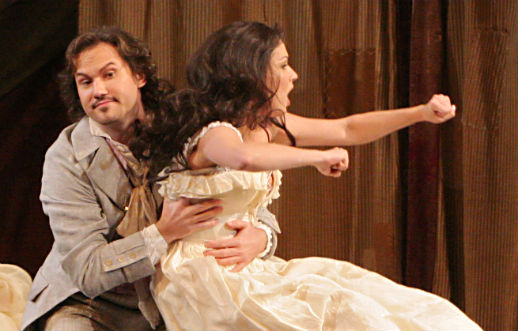

I was barely seated in my trademark family circle coin sacre, making sure my new stilettos (with a carefully arranged glimpse) combinees avec mon mink and matching turban covering my auburn hair are noticed by the whole audience (a.k.a. my subjects) when Jimmy showed us his long and hard baton.
The minute I saw James Levine I knew something was wrong. On his way to the pit, he could barely walk, even with his cane. The first and second act the orchestra kind of conducted themselves and no wonder, after a 45 minute intermission, it was announced that the maestro was sick and the remainder of the performance will be conducted by some other James (nobody was able to catch his name, even the handsome gay couple sitting by my side who made me feel as their Norina.) [Joseph Colaneri] did a finer job than Jimmy Boy.
Thank you for reading until now. The remainder of the review will be a more serious one.
Don Pasquale is a belcanto “standard” written by one of the most productive opera composers in the history of opera. This, the 64th of Donizetti’s known 66 operas, was first performed in 1843 at the Comedie-Italienne in Paris.
Anna Netrebko herself admits it is time to convert from girls to queens in her latest interview with Opera News. She is right. The woman has a gorgeous tone, yet the voice is heavy for the part. As per my voice teacher Ira Siff, she should be singing Manon Lescaut. He is right. Yet it’s with always great pleasure one watches and appreciates performers like her who truly have the time of their life on the stage, purely enjoying what they’re doing and radiating all along. Those who haven’t heard her live after the baby: It’s true, Anna’s voice got surprisingly bigger, especially in the middle. Above the staff she was still cautious and covering, perhaps saving it for the next Saturday matinee.
Matthew Polenzani is a very fine musician, who (still) keeps amazing me with his unparalleled pianissimi and heartfelt legato. Perhaps he is not very skilled as an actor, nevertheless his rendition of “Come’ gentil” was triumphant and the audience loved him. He finished the serenade with mezza voce instead of the traditional forte.
John Del Carlo has a huge basso buffo instrument, genuinely suited to this repertoire. He had done a fantastic job as Bartolo in Barbiere few years ago. Some of us may wish to see a more Italian and suave approach like Enzo Dara’s, yet his acting combined with musicianship proved to be great. One wonders why Mariusz Kwiecien is spending time and effort in belcanto repertoire when he should be singing Onegin. He has one of the most beautiful baritone materials in the world today, and the stage presence is remarkable.
Overall, duets were much better received than solos in this performance. Especially “Cheti, cheti immatinente” at the end of third act (which was partially encored!) and “Tornami a dir che m’ami” were executed divinely.
Whe it comes to the production: It is the original era. The decors are still fresh since it is a young production and one doesn’t need more than that. Changes between scenes were executed pretty rapidly, unlike some other productions (Boheme, Aida, etc…) The world’s best opera chorus does a wonderful job in its very short appearance. The orchestra had no apparent difficulty adapting itself to the unexpected new conductor.
My issue with the production was my frustration about Norina and Malatesta’s relationship. I don’t know if this was Otto Schenk’s perception of them or because it was simply Anna and Mariusz: There was a huge sexual tension between those two. By the end of their duet, they almost made out on stage. I have seen a number of Don Pasquale productions and this stood out with this unusual interpretation. It was, I think, unnecessary. Thus, the title of my review.
This Don Pasquale is really a good production, I highly recommend it. Not only because of a first grade cast who truly enjoy their art, but the simple, yet stupendous music takes one away from one’s daily struggles, questions and doubts. After all, life is fair and everything is fine the way they are. Art is here to soak us into another dimension, a deep level where, even one note of music, makes a miracle. And that is happiness.
(Photo: Marty Sohl/Metropolitan Opera)

























Comments